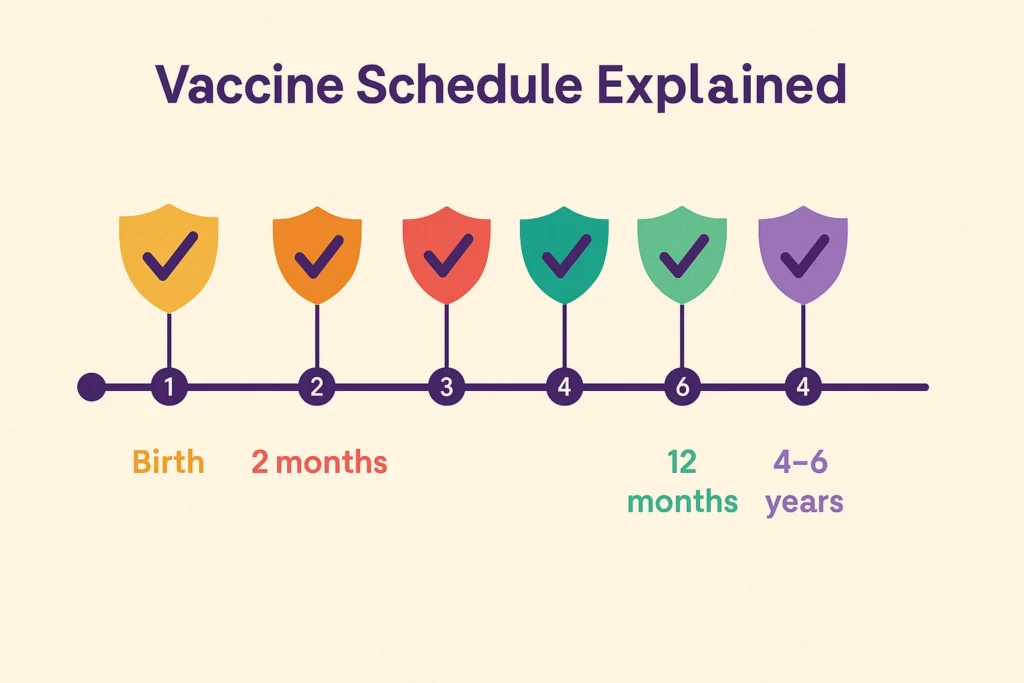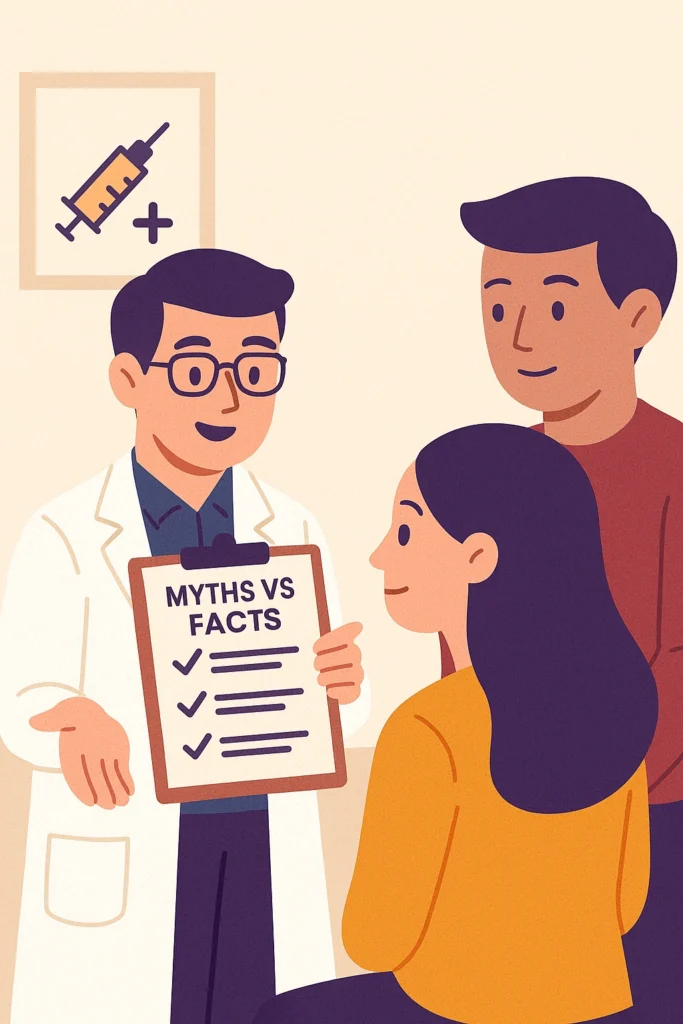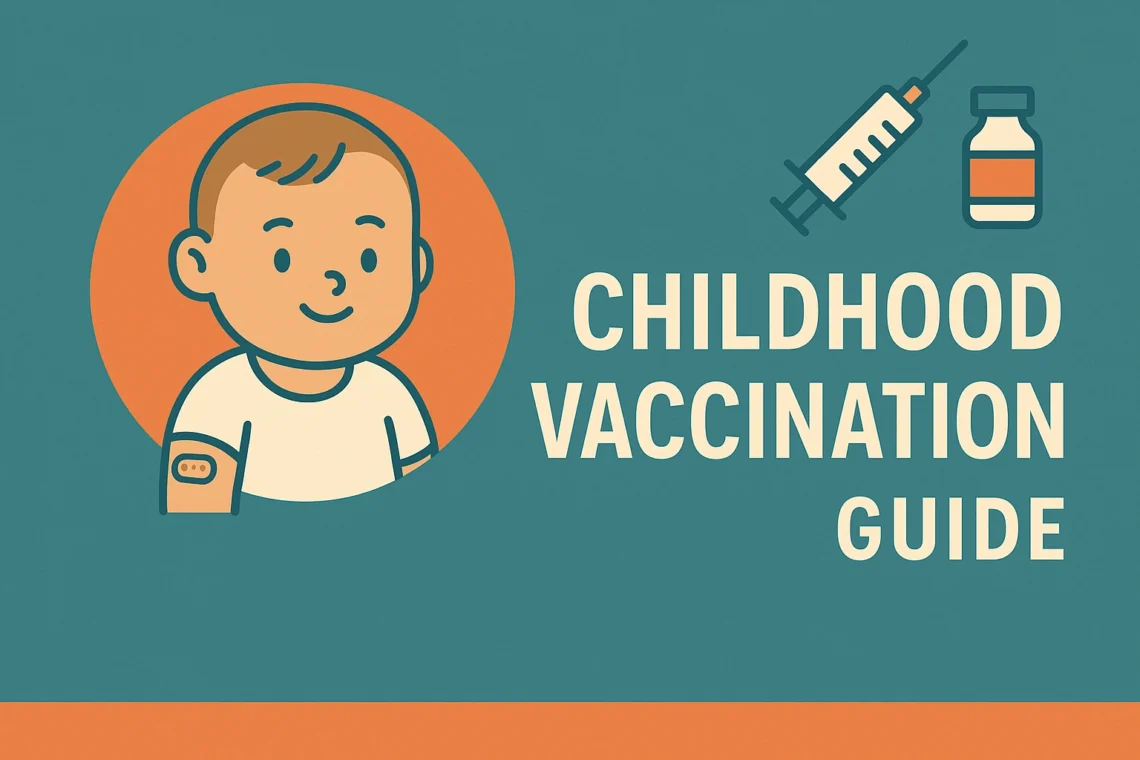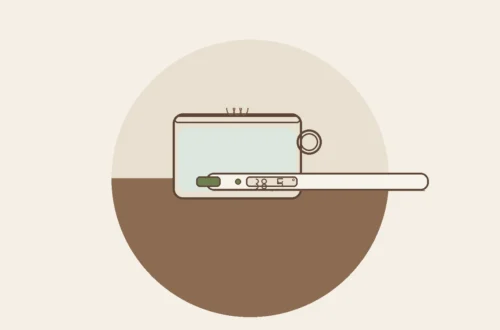Becoming a parent comes with countless responsibilities, and one of the most important is safeguarding your child’s health. Childhood vaccination for parents is one of the clearest ways to protect children from serious illnesses. Vaccines — or “shots” as we often call them — have been protecting children for decades, saving millions of lives every year.
This article provides a friendly, practical overview of childhood vaccination, helping you separate facts from fears so you can confidently support your child’s well-being.
Why Vaccination Matters?
Children are naturally curious, exploring the world with every touch, crawl, and hug. But this curiosity also exposes them to germs. Vaccines act like tiny practice runs for the immune system. They teach your child’s body how to recognize and fight dangerous infections before they ever come into contact with them.
Without vaccines, illnesses such as measles, whooping cough, or polio could spread rapidly, causing severe complications. Thanks to immunization, many of these once-deadly diseases are now rare — but they haven’t disappeared completely. A simple plane ride or an unvaccinated neighbor could reintroduce them.
How Childhood Vaccination Works in Children’s Bodies
When your child gets a vaccine, a small, harmless piece of the germ — often a protein or a weakened version of the virus — is introduced into their body. This cannot cause the actual disease, but it does spark the immune system to respond.
Understanding childhood vaccination for parents helps make sense of how immunity develops.
The body makes antibodies, which are like custom-built “soldiers” designed to fight that specific germ. Even after the antibodies fade, the immune system keeps a memory of how to defeat the disease. That way, if your child is ever exposed in real life, their body already knows what to do — fighting off the infection quickly and often without symptoms.
This is why children can receive vaccines so early and be fully protected by the time they’re most at risk.
Childhood Vaccination Schedule for Parents Explained

Parents often feel overwhelmed when handed a long chart of recommended vaccines. But understanding the timeline makes it easier:
- At Birth: Hepatitis B (protects the liver from a dangerous virus).
- 2–6 Months: Vaccines against diphtheria, tetanus, whooping cough, polio, Hib, hepatitis B, pneumococcal disease, and rotavirus.
- 12–15 Months: MMR (measles, mumps, rubella), varicella (chickenpox), and boosters of earlier vaccines.
- 4–6 Years: Booster doses before school entry.
- Adolescence: HPV, meningococcal vaccines, and Tdap booster.
Think of the schedule as a carefully designed shield, built layer by layer, giving your child the strongest protection when they’re most vulnerable.
Behind the Scenes: How Vaccines Are Tested for Safety
One of the biggest reassurances for parents is knowing how much effort goes into testing vaccines before they reach your child’s doctor.
- Laboratory and animal studies: Before a vaccine is ever tested in people, scientists study it in labs to confirm it’s safe and triggers an immune response.
- Clinical trials: Vaccines go through at least three phases of trials involving thousands of volunteers — including children — to carefully monitor safety, effectiveness, and side effects.
- Ongoing monitoring: Once approved, vaccines are tracked continuously by health agencies like the WHO, CDC, and FDA. Any unusual reaction is investigated immediately.
This process can take 10–15 years, ensuring vaccines are among the most carefully tested products in medicine.
Common Myths vs. Facts

❌ Myth 1: Vaccines cause autism.
✅ Fact: Decades of research involving millions of children show no link between vaccines and autism. The original study that suggested it was fraudulent and has been fully discredited.
❌ Myth 2: Too many vaccines overwhelm a child’s immune system.
✅ Fact: Every day, children naturally encounter thousands of germs. The immune system is more than capable of handling vaccines — in fact, modern vaccines use fewer ingredients than older versions.
❌ Myth 3: Natural immunity is better.
✅ Fact: Catching diseases like measles or chickenpox can cause severe complications, hospitalizations, and even death. Vaccines provide safe immunity without the risk of life-threatening illness.
Safety and Side Effects
It’s natural to worry about side effects. Most children experience only mild, temporary reactions like a sore arm, fussiness, or a low-grade fever. These are signs the immune system is learning.
Serious side effects are extremely rare, and health agencies around the world carefully monitor vaccines for safety. If you ever have doubts, your pediatrician can explain what’s normal and when to seek help.
Tips for Parents to Make Vaccination Easier
- Prepare your child gently: Use positive language like “the medicine will help keep you strong.” Avoid words that increase fear (“needle,” “hurt”).
- Bring comfort items: A favorite toy, blanket, or pacifier can calm a baby.
- Distraction works: Singing, blowing bubbles, or playing a short video can help older kids.
- Plan for aftercare: Have children’s acetaminophen ready if advised by your doctor. Cuddles, fluids, and rest usually do the trick.
Practical Tips to Keep Track of Vaccines
Life gets busy, and it’s easy to lose track of vaccine appointments. When it comes to childhood vaccination for parents, staying organized is key.
- Keep the vaccination card handy: Store it with other important documents and bring it to every visit.
- Use reminder apps: Many pediatric clinics offer digital reminders or portals that update automatically.
- Set calendar alerts: Add vaccine dates to your phone or family calendar so you never miss a booster.
- Ask for catch-up plans: If your child misses a shot, doctors can create a safe “catch-up” schedule.
The Bigger Picture: Community Protection
Vaccination doesn’t just protect your child — it safeguards the entire community. Some babies are too young for certain vaccines, and some children with medical conditions can’t be vaccinated. By immunizing your child, you help create “herd immunity,” reducing the spread of disease and protecting the most vulnerable.
Global Success Stories of Vaccines
The real-world impact of vaccines is one of the strongest arguments for their importance:
- Smallpox: Once a devastating disease, it was completely eradicated worldwide in 1980 thanks to vaccination campaigns.
- Polio: Once paralyzing hundreds of thousands of children each year, polio cases have dropped by over 99% worldwide.
- Measles: Global measles deaths have decreased by nearly 80% since the year 2000 because of vaccines.
These stories prove what’s possible when parents everywhere commit to immunization.
What to Do If You’re Unsure
It’s okay to feel uncertain. Instead of turning to social media posts, reach out to trusted sources:
- Your pediatrician or family doctor.
- The World Health Organization (WHO).
- The Centers for Disease Control and Prevention (CDC).
A good doctor will listen to your concerns without judgment and help you find answers.
FAQs About Childhood Vaccination for Parents
Q: Why are so many vaccines given so early in life?
A: Babies are most vulnerable to infections, and their immune systems can respond well to vaccines. Giving them early provides protection during the riskiest years.
Q: What if my child misses a vaccine appointment?
A: Don’t panic. Doctors can create a catch-up schedule to get your child back on track without restarting.
Q: Can my child still get sick even after being vaccinated?
A: Yes, but usually in a much milder form. For example, a vaccinated child who catches chickenpox may have just a few spots instead of a full-body rash.
Q: Are combination vaccines safe?
A: Yes. Vaccines like DTaP (diphtheria, tetanus, pertussis) safely reduce the number of injections while still providing full protection.
Q: What about children with allergies or chronic conditions?
A: Most can be vaccinated safely. Pediatricians will adjust the plan if there are specific risks, such as severe egg allergies for certain flu vaccines.
Q: Is it safe to get multiple vaccines in one visit?
A: Absolutely. Studies show that children’s immune systems can easily handle multiple vaccines at the same time.
Q: What should I do if my child has a reaction?
A: For mild fever or soreness, comfort and fluids are usually enough. For anything severe, call your doctor immediately.
Q: How do I talk to family members who are against vaccines?
A: Share reliable resources and speak calmly. Often, showing that you’ve done your research and trust your doctor is persuasive.
Q: Are there natural alternatives to vaccines?
A: No natural remedy can replace the immune memory that vaccines provide. Healthy habits are important, but they don’t prevent diseases like measles or polio.
Conclusion
Vaccines are a gift of modern medicine — a shield that allows children to grow, play, and dream without the shadow of dangerous diseases. As a parent, you’re not just protecting your child’s present; you’re investing in their future health and the well-being of your community.
Every shot is a step toward a healthier tomorrow.
Related Articles: Child Fever Myths





